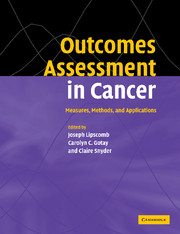Book contents
- Frontmatter
- Contents
- List of contributors
- Acknowledgments
- 1 Introduction to Outcomes Assessment in Cancer
- Health-related quality of life in cancer: general concepts and generic measures
- Assessing health-related quality of life during treatment
- Assessing health-related quality of life across the cancer continuum
- Measuring the experience and needs of cancer patients and caregivers
- Methodological considerations in applications to cancer outcomes research
- Modern psychometric theory in cancer outcomes research
- 21 Item response theory and its applications for cancer outcomes measurement
- 22 Applications of item response theory to improve health outcomes assessment: developing item banks, linking instruments, and computer-adaptive testing
- 23 Subscales and summary scales: issues in health-related outcomes
- Assessing the economic impact of cancer
- Research and policy implications
- Invited papers
- Index
- References
22 - Applications of item response theory to improve health outcomes assessment: developing item banks, linking instruments, and computer-adaptive testing
Published online by Cambridge University Press: 18 December 2009
- Frontmatter
- Contents
- List of contributors
- Acknowledgments
- 1 Introduction to Outcomes Assessment in Cancer
- Health-related quality of life in cancer: general concepts and generic measures
- Assessing health-related quality of life during treatment
- Assessing health-related quality of life across the cancer continuum
- Measuring the experience and needs of cancer patients and caregivers
- Methodological considerations in applications to cancer outcomes research
- Modern psychometric theory in cancer outcomes research
- 21 Item response theory and its applications for cancer outcomes measurement
- 22 Applications of item response theory to improve health outcomes assessment: developing item banks, linking instruments, and computer-adaptive testing
- 23 Subscales and summary scales: issues in health-related outcomes
- Assessing the economic impact of cancer
- Research and policy implications
- Invited papers
- Index
- References
Summary
Introduction
For the field of health outcomes assessment to move forward, researchers must integrate advances in measurement theory with improvements in computer technology. We need health outcomes researchers and patient advocates to guide the development of tailored health-related quality-of-life (HRQOL) instruments that meet the criteria for validity, reliability, and sensitivity to change in health status while minimizing the burden of questions for the cancer patient. Also, to accurately characterize a patient's HRQOL after disease onset or treatment (a call for more specific than generic measures), we need the ability to crosswalk scores from one instrument to another despite groups of patients receiving different sets of questions.
In Chapter 21, this volume, Reise discusses the shortcomings of traditional (i.e., classical test theory, CTT) methods that have been used to direct the development and analysis of HRQOL instruments. CTT item statistics are dependent on the particular sample of respondents, while patient scores are dependent on the particular choice of items. Such dependencies hinder the ability of researchers to combine results from studies using different HRQOL measures or to create tailored instruments by choosing specific questions from other instruments. Reise also explains how item response theory (IRT), with the properties of item parameter invariance (over samples of respondents) and respondent parameter invariance (over samples of items or questions), provides a flexible tool for instrument developers to link sets of questions measuring the same domain on a common metric and to create computerized adaptive assessments.
- Type
- Chapter
- Information
- Outcomes Assessment in CancerMeasures, Methods and Applications, pp. 445 - 464Publisher: Cambridge University PressPrint publication year: 2004
References
- 3
- Cited by



